Page Contents
What is Insomnia?
Insomnia is a sleep disorder characterized by difficulty falling asleep, difficulty staying asleep, or both. In simple terms, it is a condition that leaves you distressed by either how much you are sleeping, or the quality of your sleep.
Most of us have at one time or another suffered a bout of insomnia. Lasting a few days or weeks, it usually goes away on its own. For about 30% of American adults, however, insomnia becomes a serious problem that interferes with their health and quality of life.
Why does Insomnia Matter?
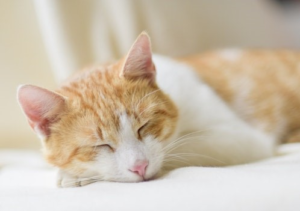 Animals need sleep. From the tiniest ants[i] who take about 250 naps every day to the largest blue whales[ii] who take multiple 30-minute naps, all animals with the exception of bullfrogs (don’t ask me why) sleep.
Animals need sleep. From the tiniest ants[i] who take about 250 naps every day to the largest blue whales[ii] who take multiple 30-minute naps, all animals with the exception of bullfrogs (don’t ask me why) sleep.
I’m not going to say any more about sleep in non-human animals as I’ve just told you everything I know about that. And to be honest, I googled it. However, I do know a fair amount about human sleep.
What’s the Impact of Insomnia?
When humans don’t get enough good quality sleep, a whole lot of unpleasant things can result. The most obvious is that we are tired during the day. Being tired makes it more difficult to accomplish the daily tasks associated with work, school, play, and keeping our households in order. Insomnia also increases the risk of accidents, both on and off the road.
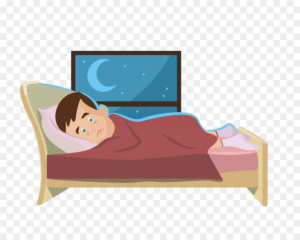 As if that weren’t bad enough, not getting enough sleep can trigger the onset of depression in people who have never before had it[iii]. It can also trigger a recurrence of depression in those who have had it in the past, and slower recovery of those currently depressed. Also elevated is the risk for substance abuse and suicide.
As if that weren’t bad enough, not getting enough sleep can trigger the onset of depression in people who have never before had it[iii]. It can also trigger a recurrence of depression in those who have had it in the past, and slower recovery of those currently depressed. Also elevated is the risk for substance abuse and suicide.
On the medical side of things, people with insomnia are at a higher risk for heart disease and obesity.
What Causes Insomnia?
There are many things that can cause insomnia. The more obvious are stress or physical illness and pain. Less obvious is the impact of medications and poor sleep habits.
If you have begun to have trouble sleeping and recently started or changed any medications, take the time to read the pharmacy description all the way through. (I know. It’s in very small print! Do it nonetheless.) Even if sleep disturbance doesn’t appear until the very end of the side effects list, that may be what is causing you trouble. If that is the case, your medical provider can likely prescribe or recommend an alternate medication that addresses your problem without hurting your sleep.
Poor sleep habits refers to those behaviors linked to the way you typically prepare to go to sleep. There are habits that promote good sleep, and there are habits that interfere with it. I talk more about this below under Sleep Hygiene.
Mental disorders such as depression, anxiety, and post-traumatic stress disorder (PTSD) are also frequent contributors to impaired sleep. As I said above, insomnia can also trigger depression. Additionally, insomnia can make anxiety and PTSD worse. In other words, it’s easy to slip into a vicious cycle of emotional distress interfering with sleep and sleep deprivation causing or worsening emotional distress.
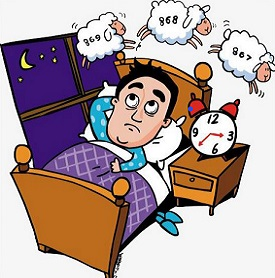 What you may be surprised to learn is that improvement in the mental disorders does not necessarily result in improvement in the insomnia[iv]. However, treating the insomnia often results in improvement in mental disorders[v].
What you may be surprised to learn is that improvement in the mental disorders does not necessarily result in improvement in the insomnia[iv]. However, treating the insomnia often results in improvement in mental disorders[v].
The other common cause of poor sleep quality is sleep apnea. Affecting many millions of people, sleep apnea is a sleep disorder that causes you stop breathing while you sleep. As a result and in addition to other consequences, you awaken multiple times per night to catch your breath. Most, if not all, people with sleep apnea are unaware they have it. What they do know is that they rarely awaken in the morning feeling rested. Further, if they have a bed-mate, that person is not happy about their snoring. The good news about sleep apnea is that it is treatable. Effectively! If you suspect you have it, please schedule an appointment with your physician to discuss your treatment options.
Treatments
People who suffer with insomnia have dreamt up all manner of solutions to their problem. Some things people have come up with have helped them but not helped others, some have not helped anyone but made for good “you won’t believe what I tried” stories. My commitment to evidenced-based practice leads me to talk to you about the only three strategies that I know are grounded in good science.
Sleeping Pills
For most people, the first thing that comes to mind when they have insomnia is sleeping pills. Prescription sleep meds certainly do work. However, they also come with side effects and risks that sometimes are worse than the problem they are meant to solve. In addition to the possibility of leaving you just as groggy during the day and a variety of physical side effects, many of them can lead to dependence. Once you become dependent on a drug, it becomes difficult to function without it.
Sleep Hygiene
Sleep hygiene refers to your sleep-related habits. Sometimes it is simply poor sleep hygiene that causes insomnia; and almost always it is poor sleep hygiene that makes it worse. Good sleep hygiene addresses both physical and psychological forces that affect sleep.
 Physical sleep hygiene behaviors
Physical sleep hygiene behaviors
-
- Do not use any stimulants for several hours before bedtime. This includes caffeinated drinks, nicotine, and any medications that have stimulating effects. If you must use stimulating meds, consult your physician about the possibility of an alternate prescription or schedule.
- Do not drink alcohol within two hours of bedtime. Although you may find alcohol relaxing, it has the opposite effect when it wears off. That is, after it relaxes you and you slip off to sleep, the rebound effect when it wears off wakes you back up.
- If you are at all susceptible to heartburn or indigestion, avoid heavy meals within two hours of bedtime.
- Do not take daytime naps.
- While light exercise in the evening does not necessarily interfere with sleep, research has found that vigorous exercise within one hour of going to bed will interfere with sleep[vi]. Plan your workouts accordingly.
- Do not use your cell phone, or similar devices, at bedtime. The blue light they emit interferes with production of melatonin which is the hormone that helps you fall and stay asleep.
- Ensure your sleep environment is quiet, dark, and comfortable.
- Keep your bedroom cool, not cold.
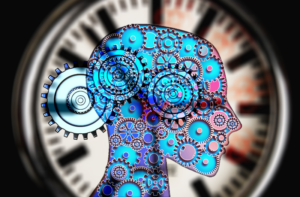 Psychological sleep hygiene behaviors
Psychological sleep hygiene behaviors
If you’ve read other blogs of mine or my most recent book, A Diet is the Last Thing You Need, you know I talk a lot about the links between things in our environment and our mind. (See Habits & Handles.) The more often you see two things together, or do something in the presence of something else, the more mentally connected those pairs become. This is called conditioning which is a fancy term to describe the habits that are formed when you repeatedly pair settings, actions, and thoughts.
For instance, if you have been suffering with insomnia and spend night after night awake tossing and turning in your bed, the mere sight of that bed will make you think about how hard it is to fall asleep. And what happens then? Right! You get into bed, pray you fall asleep, and then lie awake for hours.
The following strategies address your conditioning and the self-talk that goes with it.
-
- Use your bed only for sleep and sex. The fewer alternate activities linked to it, the fewer disruptive thoughts and urges there will be to interfere with sleep.
- Go to bed and get up at roughly the same time every day—including weekends to the extent you can. Believe it or not, our bodies can be conditioned (trained) to a sleep schedule just as surely as your dog knows when it’s time for you to fill that food dish.
- Have a consistent pre-bed routine such as putting on pajamas, brushing your teeth and washing your face, reading or listening to music for a set length of time. Obviously, the specifics of everyone’s routines will vary with their preferences and life setting. The one absolute requirement is that the routine be consistent and relaxing. This is the time of day that you are winding down. Schedule the final hour before bedtime for this wind down.
- Once you turn out the lights to go to sleep, if you are unable to fall asleep within a reasonably short time (about 15 minutes), get out of bed and do something quietly calming until you begin to feel sleepy. Do not toss and turn, nor turn on a show or do anything else in bed. The point here is to not have your bed linked in your brain with anything other than sleep (and maybe a little loving’).
Cognitive Behavioral Therapy for Insomnia (CBT-I)
Cognitive Behavioral Therapy for Insomnia brings together what we know about sleep physiology and cognitive conditioning into a structured program that has been consistently shown to effectively decrease or resolve insomnia for most sufferers[vii]. According to the Mayo Clinic, CBT-I is “equally or more effective than medications[viii].
Obviously it is beyond the scope of any blog to help you implement CBT-I. If your insomnia does not lessen simply by implementing the sleep hygiene behaviors described above, I strongly encourage you to seek a therapist who is trained in CBT-I. The links below will help your search.
If you do engage in CBT-I, here is a preview of the components you will work with.
- Sleep education—There are numerous myths about sleep that many of us believe (e.g., a good night’s sleep means you do not wake up at all between bedtime and morning). While some myths are harmless, others can add to our stress. Learning what’s real and what’s not is the first step to healing.
- Sleep diary—No different from other self-change goals, you need to have a clear picture of your current patterns if you are to figure out realistic effective adjustments to help yourself sleep better. Your diary is the most accurate way to do this.
- Sleep hygiene—As explained above, poor sleep hygiene may not necessarily have caused your insomnia, but it absolutely contributes to keeping it going.
- Cognitive restructuring—Identifying and remedying the thoughts (cognitions) causing the worry and anxiety that interfere with sleep are often key to being able to relax enough to fall asleep.
- Sleep compression—This is where your CBT-I therapist becomes invaluable. Together, you will analyze your sleep diary to help you figure out how much sleep your body actually needs and adjust your behavior and wake/sleep timing to gently compress your sleep into longer periods so that you sleep more soundly and awake more refreshed. The process is a more complicated than I can explain in this blog but there are some self-help books that might help. I list a few on the Goodreads & Resources page of this website.
Find a CBT-I Therapist
International Directory of CBT-I Providers
Society of Behavioral Sleep Medicine Provider Directory
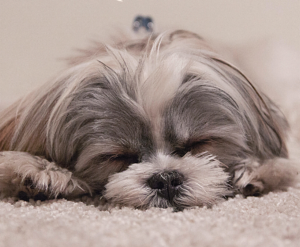
References:
[i] https://www.kingstownelawn.com/blog/do-ants-fly-sleep-bite-10-surprising-facts#:~:text=A%20recent%20study%20of%20ants,active%20at%20any%20one%20time.
[ii] https://specialtours.is/wildlife-adventures/how-do-whales-sleep/
[iii] PL Franzen, DJ Buysse (2008). Sleep disturbances and depression: Risk relationships for subsequent depression and therapeutic implications. Dialogues in Clin Neuroscience, 10(4).
[iv] K Weir (2022). Diagnosing and Treating Sleep Disorders, AMA Monitor.
[v] Scott, AJ et al, Sleep Medicine Reviews, Vol 60, 2021 — https://www.sciencedirect.com/science/article/pii/S1087079221001416
[vi] J Stutz, R Eiholzer, CM Spengler (2019). Effects of evening exercise on sleep in healthy participants: A systematic review and meta-analysis. Sports Med, 49(2): 269–287.
[vii] van der Zweerde, T., Bisdounis, L., Kyle, S. D., Lancee, J., & van Straten, A. (2019). Cognitive behavioral therapy for insomnia: a meta-analysis of long-term effects in controlled studies. Sleep medicine reviews, 48, 101208.
[viii] https://www.mayoclinic.org/diseases-conditions/insomnia/diagnosis-treatment/drc-20355173
